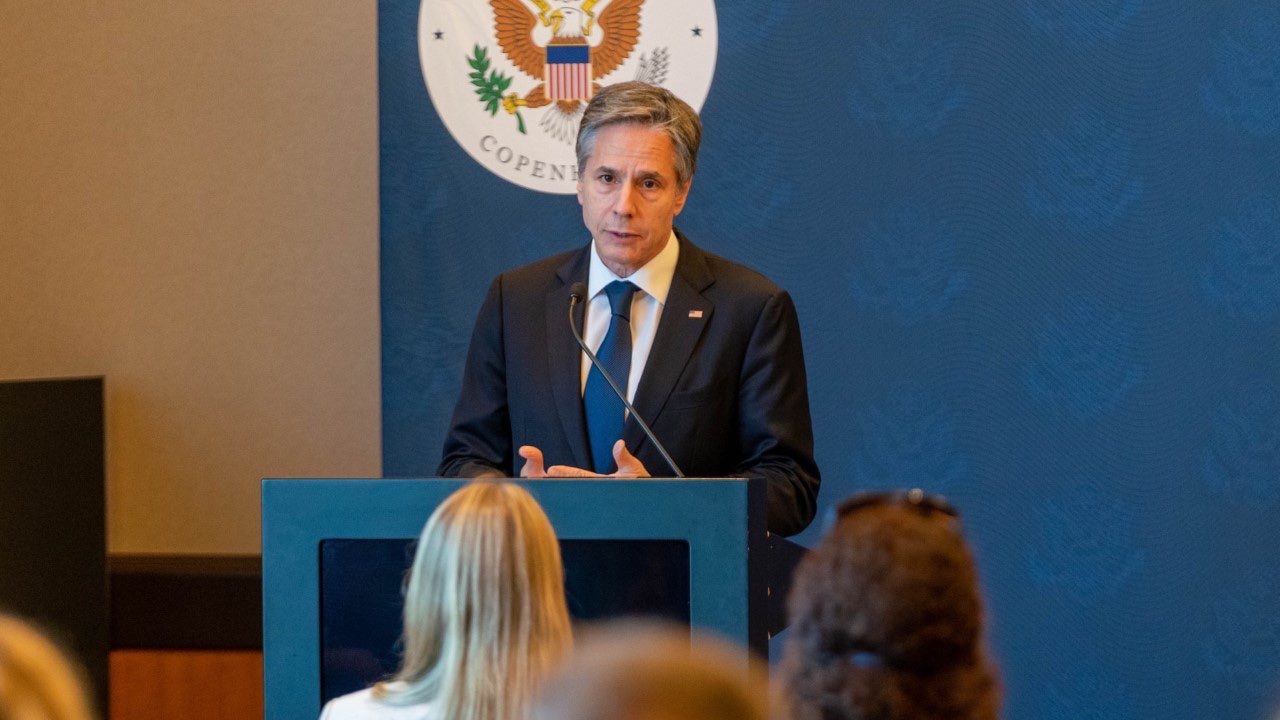Washington has yet to announce Blinken’s upcoming destinations and the meetings’ agenda.
U.S. Secretary of State Antony Blinken is visiting the Middle East “in the coming days” for the fifth time since the beginning of the war in Gaza as talks over the captives’ release and pause gain momentum, the Associated Press reported on Wednesday.
Citing the White House National Security Council spokesman John Kirby, and a State Department official, the report said Blinken’s discussions in the region will deal with Gaza’s reconstruction, increased humanitarian aid and releasing captives.
The officials did not disclose Blinken’s regional destinations.
Blinken’s previous regional tour took place between January 4-11 and covered Qatar, Jordan, the United Arab Emirates, Bahrain, Egypt, the West Bank, and Tel Aviv.
The trips at the time came as talks over other captives’ release in Gaza stalled, most notably after the Israeli killing of top Hamas official Saleh al-Arouri in Lebanon in December.
The non-stop Israeli bombardment in Gaza contributed to the stalemate, with nearly 27,000 Palestinians killed by occupation forces.
A deal has appeared to be more imminent in comparison to late last year after officials from Qatar, Egypt, the CIA and Israel met in Paris on Sunday. Qatar’s Prime Minister Sheikh Mohammed bin Abdulrahman Al-Thani was at the talks.
Sheikh Mohammed, who is also Qatar’s foreign minister, then met Secretary Blinken in Washington on Monday and discussed the latest mediation efforts in Gaza.
Speaking at an Atlantic Council panel in Washington on the same day, Sheikh Mohammed said the negotiations are now “in a much better place” in comparison to “a few weeks ago.”
“There was a clear demand of the permanent ceasefire ahead of the negotiations, which I believe that we moved from that place to a place where it potentially might lead to a ceasefire permanently in the future. And this is what we are all aiming for,” Sheikh Mohammed said.
The current proposal on the table includes a phased deal that would see at least a month-long pause to release the remaining 132 captives from Hamas in Gaza.
During the first phase, there will be a 30-day cessation of the hostilities in Gaza to enable the exchange of captives and Palestinian detainees as well as the entry of aid into the Strip. Talks would take place during the same period over another pause.
The deal aims to pave the way for a permanent ceasefire in the long run, something that Qatar has been calling for since the beginning of the war. Israel and the U.S. have repeatedly opposed a ceasefire and supported pauses instead.
While the number of Palestinian detainees expected to be released under the deal has not been disclosed, a source told Anadolu Agency on Tuesday that the number could range from 100-to-200 for each Israeli captive.
Israel had released 240 Palestinian women and children from its prisons under the previous deal mediated by Qatar and Egypt, which lasted between November 24 and December 1. The Palestinians were freed in exchange for the release of at least 110 Israeli and foreign captives from Gaza.
Commenting on the latest progress on the talks, Qatar’s foreign ministry spokesperson, Majed Al Ansari, told PBS on Tuesday that the negotiations “are at a good moment now.”
“Now we have a general understanding of what the next phase of the pause will be and how that will play out. And I would say that this is very significant, because, as long as the process is ongoing like this[…]we can be sure that at least there is a light at the end of the tunnel,” Al Ansari said.
Israel’s genocidal war on Gaza has neared four months, with more harrowing reports emerging from the besieged enclave over the dire humanitarian crisis and ongoing displacement of Palestinians.
The war has displaced more than 1.9 million people out of Gaza’s 2.2 million population, who are living in fragile tents under the harsh winter season as Israeli occupation forces levelled the majority of the Strip.
Israel has not been held to account for its atrocities and persisted in its killing, detainment and displacement of Palestinians in Gaza.







